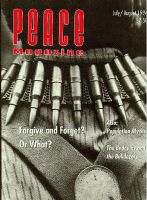
Peace Magazine Jul-Aug 1994, page 4. Some rights reserved.
Search for other articles by PMag staff here
When the war is over and the violence or repression ceases, what should be done to restore confidence and trust among a society's members? Just by chance, four of the articles we chose for this issue touch upon this question. We have grouped them together as the Science for Peace section, to show the diversity of opinions that exist among peace activists. We begin with Trudy Govier's experiences with the abuses of the Stasi in East Germany, who still do not acknowledge their wrongdoing. She found that no satisfactory solution has been achieved there. Normand Beaudet, who has recently been engaged in preventive diplomacy in Burundi, believes that compensation for victims is necessary to keep people from pursuing homemade justice in the form of vengeance. Fergus Watt and Scott Robarts write in support of a proposal to create an international criminal court, to prosecute villainous rulers individually instead of the nations that they rule. Albie Sachs, on the other hand, favors a generous policy of amnesty in his own country, South Africa, for those who persecuted others. Read the series and let us know what you think.
But that is only the beginning. Besides these articles, we bring you up to date on aspects of several areas of conflict in the world: the two feuding Yemens, the land mine problems in Cambodia, the ongoing border clashes in Kashmir, the unjust appropriation of Bedouin homes in Israel. We address some of the myths surrounding population, as we anticipate the Cairo conference on population, coming up in September. We consider the processes by which base closures are taking place in Canada. Finally, we have two regular departments: book reviews and newsworthy pages. The main review this time covers Michael Ignatieff's book, Blood and Belonging. We hope you find the issue stimulating. See you in September!

Peace Magazine Jul-Aug 1994, page 4. Some rights reserved.
Search for other articles by PMag staff here